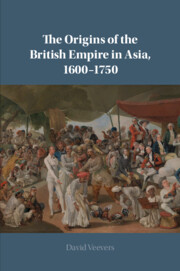Book contents
- The Origins of the British Empire in Asia, 1600–1750
- The Origins of the British Empire in Asia, 1600–1750
- Copyright page
- Dedication
- Contents
- Maps
- Acknowledgements
- Maps
- Introduction
- Part I Weakness and Adaptation
- Part II Subordination and Expansion
- Part III Limitations and Devastation
- 6 ‘The Malays Will Not Preserve ye Countrey Themselves’
- 7 ‘The Company as Their Lords and the Deputy as a Great Rajah’
- Part IV Empire
- Conclusion
- Bibliography
- Index
7 - ‘The Company as Their Lords and the Deputy as a Great Rajah’
The Making and Unmaking of an Imperial Power
from Part III - Limitations and Devastation
Published online by Cambridge University Press: 20 May 2020
- The Origins of the British Empire in Asia, 1600–1750
- The Origins of the British Empire in Asia, 1600–1750
- Copyright page
- Dedication
- Contents
- Maps
- Acknowledgements
- Maps
- Introduction
- Part I Weakness and Adaptation
- Part II Subordination and Expansion
- Part III Limitations and Devastation
- 6 ‘The Malays Will Not Preserve ye Countrey Themselves’
- 7 ‘The Company as Their Lords and the Deputy as a Great Rajah’
- Part IV Empire
- Conclusion
- Bibliography
- Index
Summary
As Company servants struggled to maintain their expansive presence on the West Coast of Sumatra, they gradually judged it more expedient to maintain or acquire the powers they sought by dominating the newly transitioning and emerging polities on the Coast. In the absence of wider imperial frameworks of power and legitimacy, Company servants assumed imperial authority for themselves, placing the Company at the summit of local hierarchies. Company servants sought to re-arrange the West Coast of Sumatra as their own imperial domain, controlling local pepper production, breaking with local political traditions, assuming sovereign authority over fortified settlements and directly exercising suzerain rights over Malay subordinates. And while the polities of the West Coast found themselves increasingly shaped by the ambition of individual Company servants, they proved more than successful in resisting their subjugation, heavily circumscribed as Company servants were by East India House’s demand for fiscal and military retrenchment and the need to ensure the profitability of their pepper settlements. With little human or material resources to support their imperialism, Company servants found themselves locked in a cycle of incessant conflict and violence with the surrounding Malay communities, demanding obedience but unable to enforce this for any prolonged period through armed force. Ultimately, empire on the West Coast of Sumatra in the short-term proved unprofitable and unsustainable, and in the long-term ultimately impossible.
Keywords
- Type
- Chapter
- Information
- The Origins of the British Empire in Asia, 1600–1750 , pp. 211 - 242Publisher: Cambridge University PressPrint publication year: 2020



